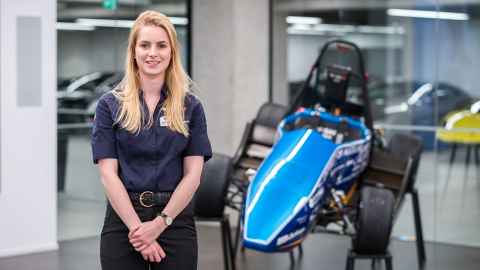Systems Engineer
Studying in the Department of Physics gave Lizzy Grant the practical skills and knowledge needed for her role as a systems engineer.

Programmes: Conjoint Bachelor of Science in Physics and Bachelor of Mechanical Engineering (Hons)
“I developed a love for physics during my senior years of school. I particularly enjoyed how physics could be applied to the real world. This led me to study a conjoint degree in physics and engineering.
“After graduating I moved to the United Kingdom to join McLaren Automotive as a Design Engineer in the concept team. I worked on designing cutting edge prototype vehicles that we will see in the future. Since then, I’ve followed my passion for electric vehicles (EVs) to work in the energy storage systems team as a Systems Engineer. Here I work on the battery development of new vehicles.
The physics programme gave me the practical lab skills and knowledge to carry out experiments thoroughly and accurately in my current role.
“All of the lab experiments I completed at university have been incredibly helpful in my role. Knowing how to develop a robust test, analyse the results and summarise them in a report is a very useful skill for the industry I am working in. The electromagnetism courses also helped to give me a good understanding of electromagnetism in batteries, which is very important when designing and certifying batteries for EVs.
“The most enjoyable part of my job is using a mixture of technical and project management skills. It is also a rapidly developing area so every day I am learning something new and challenging myself.
“The Department of Physics has so many great lecturers. Tristan O’Hanlon really inspired me during high school as my physics teacher and then was a great project supervisor during university. Studying physics is a great way to challenge yourself and broaden how you think. Even if you don’t want to continue with physics post-university, you will learn invaluable problem solving and experimental skills.”
We're always looking for stories to share from our passionate Science students.
If you have a story, we'd love to hear from you. Email science-web@auckland.ac.nz.